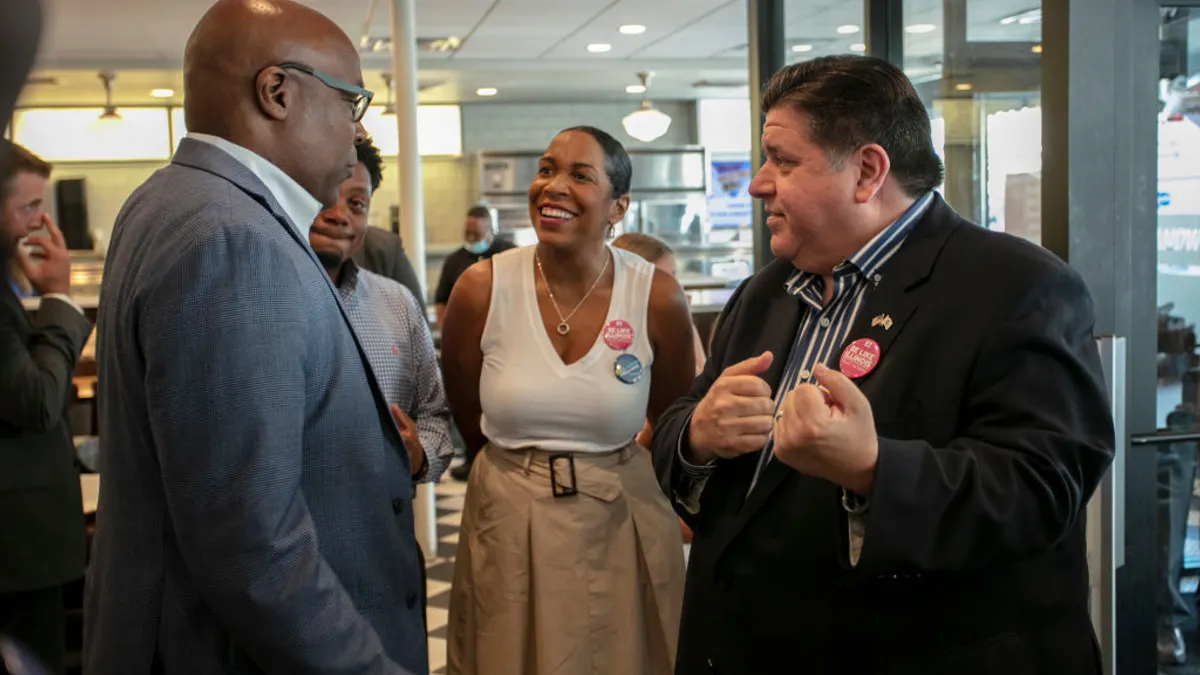In "Other Duties as Assigned," HR Dive's senior editor, Kate Tornone, weighs in on employment trends, compliance best practices and, of course, the situations that require you to go above and beyond your normal duties. Today: a look at what to expect in 2019.
Numerous compliance concerns were top-of-mind for HR professionals in 2018, and this year promises more of the same.
The Trump administration has made good on many of its deregulation promises, but others have picked up the slack, seemingly in direct response. Employees have led the #MeToo movement, used walkouts to press high-profile employers for changes and turned to third-parties to shine a light on alleged wrongdoing. Meanwhile, state and local governments continue to enact employee-friendly laws, and even some in the federal government have pushed back, declining to soften their stances at the administration's direction.
For HR, this means that lessons learned last year will continue to apply, and new challenges will arise. In a recent interview, David Garland, a member of the firm Epstein Becker Green, told me he believes that compliance in the HR world will be "more front and center than perhaps ever before."
More #MeToo
I certainly think we'll see the #MeToo movement continue, with executives departing following sexual harassment allegations. And I can only hope that employers step up their sexual harassment training in response (although it doesn't look promising). Robust reporting and investigation procedures are a must, but industry leaders — both the feds and private companies — are increasingly focused on harassment prevention training, hoping to keep misconduct from happening in the first place.
And more and more, it won't be optional. States are beginning to mandate sexual harassment training, and Garland said he thinks we'll see those numbers grow. Considering the 2018 election results at the state level, we're likely to see more employment laws there, he said, "and it would not surprise me if more of those were related to training requirements."
But there's also more to #MeToo than that, Garland said. The movement's next phase will be pay equity, he predicts. He expects that more employers will conduct audits to ensure compliance with all the new state pay equity laws. It's also worth noting that we may see the U.S. Supreme Court weigh in on that issue this year, too. The High Court will soon announce whether it will review Rizo v. Yovino, No. 16-15372 (9th Cir. April 9, 2018), a case in which the 9th U.S. Circuit Court of Appeals held that salary history alone cannot be used to justify pay gaps between men and women.
More state and local laws
Employers — especially those operating in multiple jurisdictions — report that state and local law compliance is a major headache. And it doesn't look like it's going away any time soon. In addition to the training mandates that Garland noted, we're seeing salary history bans, predictable scheduling requirements and more.
Perhaps most notable is the increase in the legalization of recreational marijuana that continues to force employers to rethink policies and procedures. At least ten have done so expansively, according to Governing magazine, and "we can expect that there will be other states to follow," Garland said. Employers in affected states must review the laws' impacts on drug testing, but also are rethinking hiring rules, Garland noted. Because of the tight job market, some operating under these laws are taking a more relaxed approach to off-duty marijuana use for non-safety-sensitive positions. And again, considering the election results, we can expect activity in these areas to continue unabated.
Nothing from Congress
Many of the employment questions we write about could be resolved with federal legislation. Take the recent tip pooling debacle for example: The U.S. Department of Labor (DOL), under President Obama, adopted employee-friendly tip pooling regulations. When the Trump DOL moved to rescind those rules, it was revealed that it had omitted from its proposal an internal analysis showing that the change could cost workers billions in gratuities if managers kept tips for themselves — something the law arguably would have allowed but DOL said was unlikely. DOL said its hands were tied, so Congress stepped in and swiftly amended the Fair Labor Standards Act (FLSA).
I asked Garland whether that something like that might be in the cards for joint employment, for example. Enforcement agencies maintain different standards for joint employment under the FLSA and the National Labor Relations Act, complicating an already-confusing compliance area for employers. And if that weren't bad enough, these agency interpretations now change every time the White House turns over.
Garland's answer? Don't hold your breath. We're two years into the new administration and still without a DOL Wage and Hour Division administrator but it's still more likely we'll see movement at DOL before we see it from Congress, he said.
The same goes for other issues, too. Federal proposals to pre-empt these new state and local laws — like one that would allow employers to opt out of state and local paid leave laws — aren't likely to find success any time soon, Garland said; "I just don't see that working its way to the front of the line, particularly in a divided Congress."
Sometimes landmark Supreme Court decisions spur Congress into action, as Ledbetter v. The Goodyear Tire & Rubber Company, Inc. did, leading to the Lilly Ledbetter Fair Pay Act. Given today's social climate, I figured that the sexual orientation discrimination cases now before the Court could lead to the same result: the current justices agree to hear the cases, interpret Title VII strictly and end up putting some momentum behind some version of the Employment Non-discrimination Act that has been languishing in Congress since the early 90s.
But again, Garland says it's not in the cards for 2019. It's possible the High Court will take up the issue, but don't count on a quick response from Congress, he said. "[W]e're going to have a divided congress the next two years. I don't expect something as swift as Ledbetter and legislation following it.




















